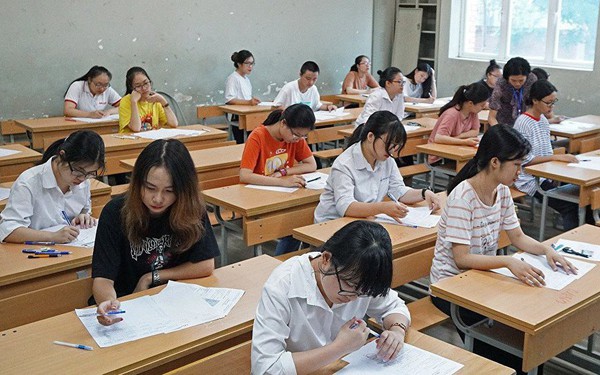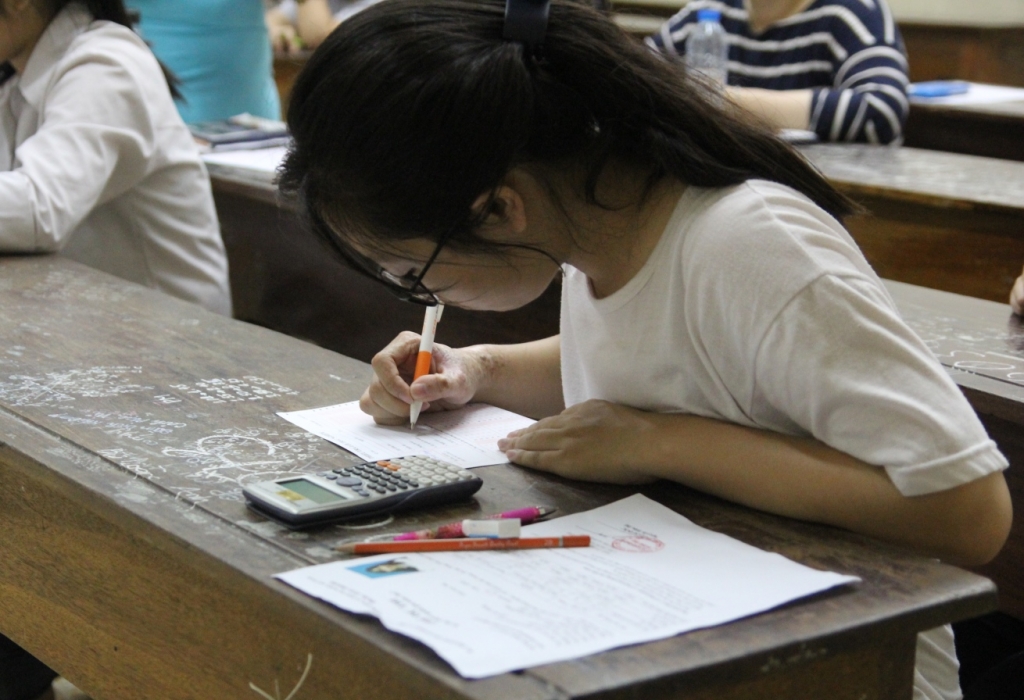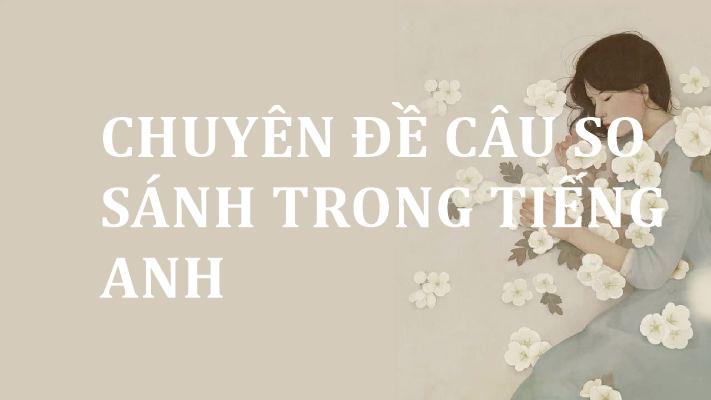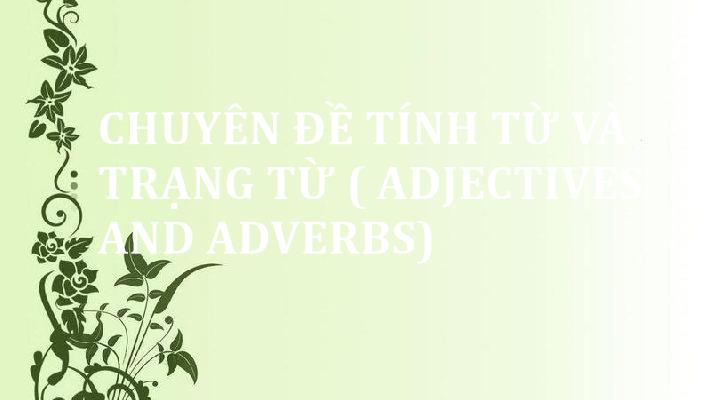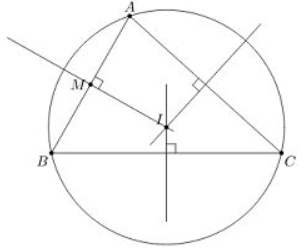INVERSION (ĐẢO NGỮ)
I.
GIỚI THIỆU
Đảo ngữ là hiện
tượng đảo ngược vị trí động từ hoặc
trợ động từ lên trước chủ ngữ nhằm mục đích nhấn mạnh. Trong trường hợp đó ngữ
pháp sẽ thay đổi, đằng sau phó từ
(auxiliary) đứng đầu câu là trợ động từ rồi mới đến chủ ngữ và động từ
chính.
Ví dụ: No money shall I lend you from now on.
Đây
là dạng bài xuất hiện rất nhiều trong kì thi THPT quốc gia.
II.
CÁC DẠNG ĐẢO NGỮ
1. Đảo ngữ với NO và NOT

Ex:
No money shall I lend you from now on.
(= Not any
money shall I lend you from now on.)
2. Đảo ngữ với các trạng từ phủ định
- never: không bao giờ
- hardly: hầu như không
- little: ít khi, hiếm khi
- rarely: hiếm khi
- seldom: hiếm khi
- scarcely: hiếm khi
- hardly ever: hầu như không bao giờ

Ex:
Never in Mid-summer does it snow.
Hardly ever does he speak in the public.
3.
Đảo ngữ với ONLY
a. Loại 1
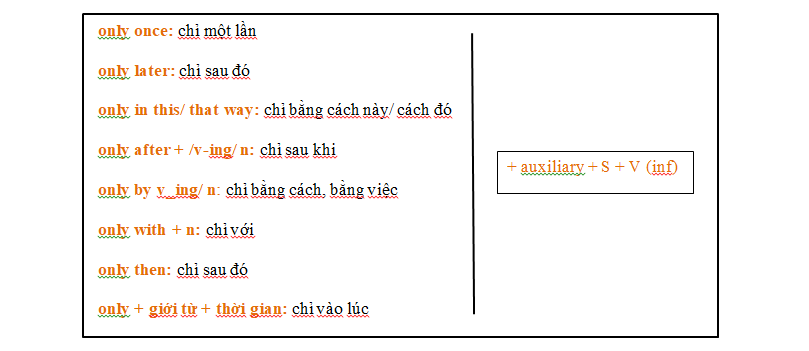
Ex:
Only after all
guests had gone home could we relax.
Only
when I understand her did I like her.
Only
by practising English every day can you speak it fluently.
b. Loại 2

Ex:
Only when she left did he understand her love for him.
4.
Đảo ngữ với các cụm từ có NO
- at no time: không bao giờ
- on no condition: không đủ khả năng,
dù thế nào
- on no account: không thể nào, không
..... trong bất kỳ hoàn cảnh nào
- under/ in no circumstances: không
bao giờ
- for no searson: không có lý do gì
- in no way: không thể nào, không thể
- no longer: không..........nữa

Ex:
For no reason will we surrender.
No longer does he work here.
5. No sooner…than

Ex:
No sooner had I arrived home than the telephone rang.
Hardly
had she put up her umbrella before the rain becam down in torrents.
6. Not only…but…also

Ex:
Not only is he good at English but he also
draws very well.
Not only does he sing well but he also
plays musical instruments perfectly.
7. Đảo ngữ với SO/SUCH

Ex: So busy am I that I don’t have time to look after myself.
So
difficult was the exam that few student pass it

Ex: Such was her anger
the she broke the vase.
8. So + adjective + be + N + clause
Ex: So intelligent is that
she can answer all questions in the interview.
9. Đảo ngữ với UNTIL/TILL

Ex:
I won’t come home till 10 o’clock.
→ Not until/ till o’clock that
I will come home.
(= It
is not until 10 o’clock that I will come home.)
I didn’t know
that I had lost my key till I got home.
→ Not until/ till I got home
did I know that I had lost my key.
10. Đảo ngữ với NOWHERE

Ex: Nowhere in the
Vietnam is the scenery as beautiful as that in my country.
Nowhere
do I feel as comfortable as I do at home.
11. Đảo ngữ với NEITHER

Ex: There is neither
excitement nor entertainment in this small town.
→ Neither is there excitement nor
entertainment in this small town.
12. Đảo ngữ với câu điều kiện
a. Câu điều kiện loại 1

Note: nếu phủ định thì
cho NOT sau chủ ngữ
Ex: If
he lends me some money, I will buy that house.
→ Should
he lend me some money, I will buy that house.
b. Câu điều kiện loại 2

Ex: If I knew
her, I would invite her to the party.
→ Were I to know her, I would
invite her to the party.
Lưu ý: Nếu sau nó là danh từ
hoạc tính từ thì có thể bỏ cụm to-V.
( Ex: Were I you, I
would go home. )
c. Câu điều kiện loại 3

Note: nếu phủ định thêm
NOT vào chủ ngữ.
Ex: If my parents had
encouraged me, I would have passed exam.
→ Had
my parents encouraged me, I would have passed exam.
13. Đảo ngữ nhấn mạnh tính từ
Trong
tiếng Anh có thể đảo tính từ, cụm tính ngữ làm bổ ngữ của “tobe ” ra trước để
nhấn mạnh, đồng thời đảo “to be” ra trước S (chủ ngữ).
Ex: The problem is
easy.(Vấn đề này đơn giản.)
→ Easy is the problem. (nhấn mạnh
tính đơn giản của vấn đề )
14. Đảo ngữ nhấn mạnh động từ
Có
thể nhấn mạnh động từ ở thì hiện tại đơn và quá khứ đơn bằng cách thêm trợ động từ ở dạng tương ứng với thì.
Ex: I stayed at home
yesterday.
→ I did stay at home yesterday.
BÀI
TẬP ĐẢO NGỮ
I.
Rewrite these sentences, using the words given.
1.
She had never been so happy before.
®
Never before
2.
She has rarely travelled more than fifty miles from her village.
®
Rarely
3.
They had seldom participated in such a fascinating ceremony.
®
Seldom
4.
Public borrowing has seldom been so high.
®
Seldom
5.
They little suspected that the musical was going to be a runaway success.
®
Little
6.The film had never before laid on such a sumptuous celebration.
®
Never
7.
I've never come across such a horrifying film.
®
Never
8.
The embassy staff little realized that Ted was a secret agent.
®
Little
9.
I have never seen anyone in my life drink as much as you.
®
Never
10. One rarely finds good service these days.
®
Rarely
II.
Rewrite these sentences, using the words
given.
1.
He is my friend as well as yours.
®
Not only
2. He not only spent all his money but also borrowed some from me.
®
Not only
3.
Harry not only broke his leg but also injured his shoulder.
®
Not only
4.
He translates not only fast but also correctly.
®
Not only
5. He only thought about having a holiday abroad after
he retired.
® Only
6.
He had hardly left the office when the telephone rang.
®
No sooner
7.
I had only just put the phone down when the boss rang back.
®
Hardly
8.
He didn’t finish his work until the bell rang.
®
Not until
9.
We only began to see the symptoms of the disease after several months.
®
Only
10.
A sleeping dog was lying under the table.
®
Under the table
III.
Rewrite these sentences, using the words
given.
1. I only realized how dangerous the situation had been when I got home.
®
Only
2. I
understood Hamlet only after seeing it on the stage.
®
Only
3. They
didn’t get round to business until they had finished eating.
®
Only
4.They had to wait for twelve hours before their
flight left.
®
Only
5. The only
way you can become a good athlete is by training hard every day.
®
Only
6. If the
Government is forced into another election, it will be the favorable to win.
® Should
7. If you
want to make an appointment to see Dr Simons, she is free after 9. A.M.
®
Should
8.
If he weren’t busy right now, he could help them.
®
Were
9.
If she had said sorry, he wouldn’t have been angry.
®
Had
10.
If the computer hadn’t broken down, I wouldn’t have had to stop my work.
®
Had
IV. Choose A, B, C, or D to
indicate the sentence that is CLOSEST in meaning
|
1. |
The
weather was so beautiful that we decided to go to the beach. |
|
|
A. So
beautiful
was the weather that we decided to go to the beach. |
|
|
B. Such beautiful is the weather that we
decided to go to the beach. |
|
|
C. The weather is so beautiful
that we decided to go to the beach. |
|
|
D. So beautiful
is the weather that we decided to go to the beach. |
|
2. |
I
have never heard such nonsense! |
|
|
A. Never
did
I hear such nonsense. |
|
|
B. Never have I heard such nonsense. |
|
|
C.
Never I
have heard such nonsense. |
|
|
D. Have
I never
heard such nonsense. |
|
3. |
Our
profits have never been higher than they are this year. |
|
|
A. Never
are
our profits higher than they are this year. |
|
|
B.
Never have
our profits been higher than they are that year. |
|
|
C. Never
have
our profits higher than they are this year. |
|
|
D.
Never have
our profits been higher than they are this year. |
|
4. |
They
had seldom participated in such a fascinating ceremony. |
|
|
A. Seldom
had
they participated in such a fascinating ceremony. |
|
|
B.
Seldom they
had participated in such a fascinating ceremony. |
|
|
C. Seldom
have
they participated in such a fascinating ceremony. |
|
|
D. Seldom
had
they participated in so a fascinating ceremony. |
|
5. |
She
didn't realize what would happen to her next. |
|
|
A. Little
does
she realize what would happen to her next. |
|
|
B.
Little did
she realize what would happen to her next. |
|
|
C.
Little she
did realize what would happen to her next. |
|
|
D.
Little she
realized what would happen to her next. |
|
6. |
She
not only wrote the text but also selected the illustrations. |
|
|
A. Not
only
she wrote the text but also selected the illustrations. |
|
|
B. Not
only
did she write the text but also she selected the illustrations. |
|
|
C. Not
only
did she write the text but also selected the illustrations. |
|
|
D. Not
only
she had written the text but also selected the illustrations. |
|
7. |
They
are not only good at mathematics but also at science. |
|
|
A. Only they are not good at mathematics but also at science. |
|
|
B. Not are they only good at
mathematics but also at science. |
|
|
C. They are not good at
mathematics but also at science. |
|
|
D. Not
only
are they good at mathematics but also at science. |
|
8. |
The
facts were not all made public until later. |
|
|
A. Only
later
until the facts were all made public. |
|
|
B. The facts only until later were all
made public. |
|
|
C. Only
until
later are the facts all made public. |
|
|
D. Only
until
later were the facts all made public. |
|
9. |
It
wasn’t until last week that the Agriculture Minister admitted defeat. |
|
|
A. Only the the Agriculture
Minister admitted defeat until last week. |
|
|
B. The Agriculture Minister
admitted defeat not last week. |
|
|
C. The Agriculture Minister
admitted defeat until last week. |
|
|
D. Only
until
last week did the Agriculture Minister admit defeat. |
|
|
|
|
10. |
I
won’t agree until Tom’s apologized. |
|
|
A. Only
until
Tom's apologized will I agree. |
|
|
B. I won’t agree if Tom apology. |
|
|
C. Only when Tom apologized did I
agree. |
|
|
D. Only Tom can apologize to me. |
|
11. |
.
The door could not be opened without using force. |
|
|
A. Only
using
force could the door be opened. |
|
|
B. Only by using force you can’t
open the door. |
|
|
C. Only
using
force could the door open. |
|
|
D. Only
force
couldn’t open the door. |
|
12. |
If
you have further problems with your printer, contact your dealer for advice. |
|
|
A. Have you should
further problems with your printer, contact your dealer for advice. |
|
|
B. Have
you
had further problems with your printer, contact your dealer for advice. |
|
|
C.
Should you
have further problems with your printer, contact your dealer for advice. |
|
|
D. Have
you
further problems with your printer, contact your dealer for advice. |
|
13. |
If
you change your mind, there will always be a job for you here. |
|
|
A. Should
you
to change your mind, there will always be a job for you here. |
|
|
B.
Should you
change your mind, there will always be a job for you here. |
|
|
C. Should
you
change your mind, there will always be no job for you here. |
|
|
D.
Should you not change your mind, there will always be
a job for you here. |
|
14. |
It
is such hot coffee that I can't drink it. |
|
|
A. Such
is
hot coffee that I can't drink it. |
|
|
B. Such
hot
coffee is that I can't drink it. |
|
|
C. Such
is
the hot coffee that I can drink it. |
|
|
D. Such
is
hot coffee that I can drink it. |
|
15. |
It
was such a foggy day that we couldn’t see the road. |
|
|
A. Such a foggy day was that we
couldn’t see the road. |
|
|
B. So foggy was a day that we couldn’t see the road. |
|
|
C. So was a foggy day that we
couldn’t see the road. |
|
|
D. Such
was
a foggy day that we couldn’t see the road. |
|
16. |
As
soon as I got into the bath, someone knocked at the door. |
|
|
A. Hardly
had
I got into the bath than someone knocked on the door. |
|
|
B. No
sooner had
I got into the bath when someone knocked on the door. |
|
|
C. No
sooner had
I got into the bath than someone knocked on the door. |
|
|
D. Barely
had
I got into the bath than someone knocked on the door. |
|
17. |
Press
photographers are banned from taking photographs backstage. |
|
|
A. On no
account press
photographers are allowed to take photographs backstage. |
|
|
B. On
no account were
press photographers allowed to take photographs backstage. |
|
|
C. On
no account are
press photographers allowed to take photographs backstage. |
|
|
D. There is no account for press
photographers allowed to take photographs backstage. |
|
18. |
As
soon as we had come home, it started to rain |
|
|
A. No
sooner had
we come home when it started to rain. |
|
|
B. Barely had we come home than it
started to rain. |
|
|
C. Scarcely had we come home than
it started to rain. |
|
|
D. No
sooner had
we come home than it started to rain. |
|
19. |
She
was so tired that she fell asleep in the armchair. |
|
|
A. Such
tired
was she that she fell asleep in the armchair. |
|
|
B. So
tired
was she that she fell asleep in the armchair. |
|
|
C. So
tired
she was that she fell asleep in the armchair. |
|
|
D. Such
tired
she was that she fell asleep in the armchair. |
|
20. |
He
is such a lazy boy that no one likes him. |
|
|
A. So
is
a lazy boy that no one likes him. |
|
|
B. Such
a
lazy boy is he that no one likes him. |
|
|
C. Such
a
lazy boy is that no one likes him. |
|
|
D. Such
is
a lazy boy that no one likes him. |
|
|
|
|
21. |
As
soon as we had turned on the TV, the electricity went out. |
|
|
A. Hardly
had
we turned on the TV when the electricity went out. |
|
|
B.
Hardly had
we turned on the TV, the electricity went out. |
|
|
C. No
sooner had
we turned on the TV when the electricity went out. |
|
|
D.
Barely had we turned
on the TV than the electricity went out. |
|
22. |
As
soon as I had got out of the bed, the phone rang. |
|
|
A.
No
sooner had I got out of bed when
the doorbell rang. |
|
|
B.
Scarcely had
I got out of bed when the doorbell rang. |
|
|
C. Hardly had I got out of bed
than the doorbell rang. |
|
|
D. The phone keep ringing when I
started to get out of bed. |
|
23. |
The
bus driver cannot be blamed for the accident in any way. |
|
|
A. In no way the bus can be blamed
for the accident. |
|
|
B. In
no way can
the bus be blamed for the accident. |
|
|
C. The bus came in no way and was
blamed for the accident. |
|
|
D. The bus was blamed but it was
no way. |
|
24. |
His
brother had rarely been more excited. |
|
|
A. His brother had been more
excited. |
|
|
B. Rarely had his brother been more excited. |
|
|
C. Rarely his brother had been
more excited. |
|
|
D. His brother had never been
excited. |
|
25. |
He
ate so much food that he became ill. |
|
|
A. So
much
food did he eat that did he become ill. |
|
|
B. Such
much
food did he eat that he became ill. |
|
|
C. So
much
food did he eat that he became ill. |
|
|
D. So much food he ate that he
became ill. |
|
26. |
If
you wish to take advantage of the offer, kindly tick the box on your order
form. |
|
|
A. Should
you
wish to take advantage of the offer, kindly tick the box on your order form. |
|
|
B. Had you ticked the box on your
order form, you could take advantage of the offer. |
|
|
C. Tick the box on your order
form, you should wish to take advantage of the offer. |
|
|
D. Wish you to take advantage of
the offer, kindly tick the box on your order form. |
|
27. |
He
was such a fast speaker that we couldn’t understand him. |
|
|
A. Such
was
a fast speaker that we could understand him. |
|
|
B. Such
was
a fast speaker that we couldn’t understand him. |
|
|
C. He was so fast a speaker that
we could understand him. |
|
|
D. He spoke fast and it was
understandable. |
|
28. |
The
snowfall was so heavy that all the trains had to be cancelled. |
|
|
A. So
heavy
was the snowfall that all the trains had to be cancelled. |
|
|
B. So
heavy
the snowfall was that all the trains had to be cancelled. |
|
|
C. The snowfall was such heavy
that all the trains had to be cancelled. |
|
|
D. All the train had to be
cancelled but the snowfall was heavy. |
|
29. |
Just
after the play started there was a power failure. |
|
|
A. No sooner the play had the play
started when there was a power failure. |
|
|
B. No sooner had the play started
when there was a power failure. |
|
|
C.
Hardly had
the play started when there was a power failure. |
|
|
D. Hardly
had
the play started when a power failure was. |
|
30. |
He
is so strong that he can lift the box. |
|
|
A. So
strong
is he that he can lift the box. |
|
|
B. So strong but he can lift the
box. |
|
|
C. He is strong and he lift the
box. |
|
|
D. So strong is the box he can
lift. |
ĐÁP ÁN
I.
1.
Never before had she been so happy.
2.
Rarely has she travelled more than fifty miles from her village.
3.
Seldom had they participated in such a fascinating ceremony.
4.
Seldom has public borrowing been so high.
5.
Little did they suspect that the musical was going to be a runaway success.
6.
Never before had the film laid on such a sumptuous celebration.
7.
Never have I come across such a horrifying film.
8.
Little did the embassy staff realize that Ted was a secret agent.
9.
Never in my life have I seen anyone drink as much as you.
10.
Rarely does one find good service these days.
II.
1.
Not only is he my friend but also yours.
2.
Not only did he spend all his money but also borrowed some from me.
3.
Not only did Harry break his leg but also injured his shoulder.
4.
Not only does he translate fast but also correctly.
5.
Only after he retired did he think about
having a holiday abroad.
6. No sooner
had he left the office than the bell rang.
7. Hardly had
I put the phone down when the boss rang back.
8. Not until
the bell rang did he finish his work.
9. Only after
several months did we begin to see the symptoms of
the disease.
10.
Under the table was lying a sleeping dog.
III.
1.
Only when I got home did I realize how dangerous the situation was.
2.
Only after seeing it on the stage did I understand it.
3.
Only after they had finished eating did I get round to business.
4.
Only after they had waited for twelve hours did their fight leave.
5.
Only by training hard every day can you become a good athlete.
6.
Should the government be forced into another election, it
will be the favorable to win.
7.
Should you want to make an appointment
to see Dr Simons, she is free after 9 AM.
8. Were he not busy right now, he could help them.
9.
Had she said sorry, he wouldn’t have been angry.
10. Had the computer not broken down, I wouldn’t have had to stop my work.
IV.
|
1 |
A |
7 |
D |
13 |
B |
19 |
B |
25 |
C |
|
2 |
B |
8 |
D |
14 |
A |
20 |
D |
26 |
A |
|
3 |
D |
9 |
D |
15 |
D |
21 |
A |
27 |
B |
|
4 |
A |
10 |
A |
16 |
C |
22 |
B |
28 |
A |
|
5 |
B |
11 |
A |
17 |
C |
23 |
B |
29 |
C |
|
6 |
C |
12 |
C |
18 |
D |
24 |
B |
30 |
A |

